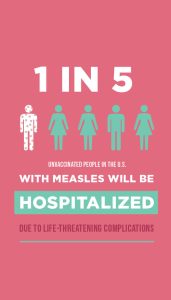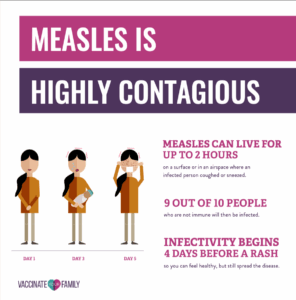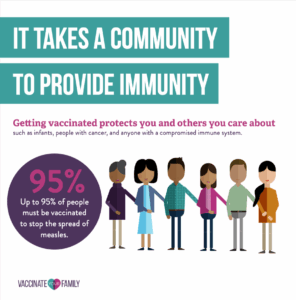Suzanne
A Measles Story
Place of Residence: Fort Myers, Florida
As an older adult, Suzanne shares her story of surviving measles as a child before vaccines were available and describes the life-long complications she’s endured as a result of her illness.
What were you like as a child? What are some things you enjoyed doing prior to your illness?
I was always a big reader growing up—books were my favorite escape. I could spend hours lost in stories, often preferring a good book over anything else. I didn’t grow up with electronics, so most of my time was spent outside playing and using my imagination. I especially loved playing with my Barbie dolls, creating entire worlds and storylines for them.
I genuinely enjoyed school as a child. I was always eager to learn and took pride in being a good student. I loved the structure, the challenges, and the chance to connect with my teachers and classmates.
 When did you first become sick? How were you acting and feeling?
When did you first become sick? How were you acting and feeling?
When I was six years old, I vividly remember feeling incredibly sick—feverish, weak, and utterly miserable. The worst of it was being confined to my bed, completely drained of energy, with a high fever that wouldn’t break. My most striking memory from that time is lying in bed under a large canvas tent my parents had set up in an effort to darken the room and ease my light sensitivity—a symptom often caused by measles.
I believe I likely contracted measles at school—back then, children were in school all day with little knowledge of how infectious diseases spread or how easily outbreaks could happen in classrooms.
How did your illness progress? At what point did you realize your illness was serious?
I could tell how serious the situation was just by the look on my mother’s face—an expression filled with worry and exhaustion. It brought back a conversation I had overheard between my parents and the doctor: if I didn’t start improving soon, hospitalization would be the next step.
I had a very serious case of measles. My mother did everything she could at home to keep me comfortable—placing cold, damp rags on my forehead and neck in a desperate attempt to lower my relentless fever. Still, my symptoms persisted. I was dangerously close to being hospitalized, and my parents were on high alert. My fever finally broke, but it was touch and go.
What I endured left a lasting impression: measles wasn’t just a childhood illness—it was a terrifying and physically grueling experience that left me bedridden for days and almost led to a hospital stay.
 What was your recovery like?
What was your recovery like?
My integration back into school was very difficult. After being so sick, getting back into the routine of early mornings, homework, and sitting through a full day of classes was overwhelming.
My sister, Mary Beth, did her best to tutor me and support my learning at home, but even with that extra help, it was a struggle. I had been out of school for several weeks and had fallen behind in schoolwork. For a child who was always a good student, it was frustrating. My energy levels took a long time to recover.
After measles, it seemed that I was sick all the time. My immune system had clearly taken a hit. I caught other illnesses more often and took longer to recover, something that hadn’t been the case before.
Are you suffering from any long-term medical complications as a result of your illness?
To this day, I feel that my immune system was affected from measles. It’s as if my body has been playing catch-up ever since. I believe the lingering effects of that one illness continue to shape my health even years later.
Chronic bronchitis became a recurring problem for me, something I never dealt with before measles. I currently struggle with a persistently low white blood cell count, which makes it harder for my body to fight off infections. As a result, I’m more susceptible to what seems like every bug, and it takes longer to recover when I do get sick.
 What do you want others to know about measles? What advice would you give someone who chose not to get vaccinated?
What do you want others to know about measles? What advice would you give someone who chose not to get vaccinated?
I want today’s parents to hear me clearly: children like me lived through a terrible experience because vaccines weren’t available to protect us. But now they are. No child should have to go through what I did, especially when there’s a safe, effective way to prevent it.
Parents need to understand that every child is different. While some might have a milder case, others, like me, can become dangerously ill. Measles isn’t just a rash and a fever—it can have serious, lasting consequences.
To this day, I believe many of my current medical issues stem from that measles infection. It affected me not just in the moment but for years afterward.
 What have you or your loved ones done up to this point to raise awareness about vaccine-preventable diseases?
What have you or your loved ones done up to this point to raise awareness about vaccine-preventable diseases?
Everyone in my family knows I’m pro-vaccine. I’ve never shied away from sharing my views, especially because I’ve lived through the consequences of a vaccine-preventable disease.
My son and his wife have a 4-month-old daughter. Even though they know my measles story and the importance of getting her vaccinated, I worry about her until she can get her first measles dose given the unnecessary outbreaks happening around the country—which I believe are a result of vaccine misinformation.
I’ve also used my social media platforms to speak up by sharing my personal experiences and encouraging others to vaccinate their children. It’s one of the most important things I feel I can do: to use my voice and my story to help protect the next generation.
A stock image has been used for this story to protect Suzanne’s privacy.
BECOME A VACCINE ADVOCATE
There are lots of ways you can make a difference in your community.

 When did you first become sick? How were you acting and feeling?
When did you first become sick? How were you acting and feeling? What was your recovery like?
What was your recovery like? What do you want others to know about measles? What advice would you give someone who chose not to get vaccinated?
What do you want others to know about measles? What advice would you give someone who chose not to get vaccinated? What have you or your loved ones done up to this point to raise awareness about vaccine-
What have you or your loved ones done up to this point to raise awareness about vaccine-